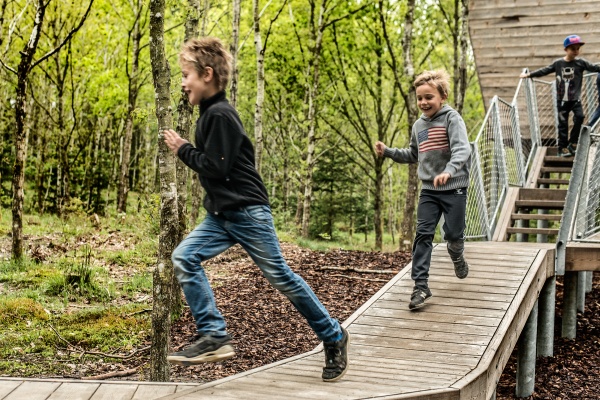New school, new luck
Wenn es eng wird im eigenen Haus, weil die Familie wächst, ist es Zeit für einen Wohnungswechsel. Besteht gar die Möglichkeit für einen Neubau, umso besser, lassen sich doch so...


YOUR FORUM FOR PLAY, SPORTS UND LEISURE AREAS

Trampolines, obstacle course, skate park: In the context of a study the playgrounds of a Danish school were made more attractive. The gratifying result: not only has physical activity changed to the better but also social behaviour.
The Skörping School in Denmark is situated in a hilly landscape surrounded by dense forests. Whoever may come to visit this place will have the feeling of rather finding themselves in the midst of the German Black Forest than in Denmark. From outside, the school looks rather unpretentious whereas its schoolyard gives a completely different picture as it looks like an adventure park with its trampolines embedded in the ground, an obstacle course, a large concrete skate park and much more. Everywhere there are children frolicking around. Hardly any of the girls and boys stay inside the school building during the first longer break of half an hour. Henriette Andersen, a scientist for sports and bio mechanism of the University of Southern Denmark SDU, has helped to develop the new schoolyard design and later analysed, if and in which way the new design can contribute to a change in the students' behaviour.
"According to our findings, more children go outside during the breaks and also stay outside for longer than they did before the renovation. This means that we have managed to bring the children outside and be more physically active."
In particular we managed to motivate even those children to frolic about in the schoolyard who don’t usually exercise very much. This is, however, not due to the fact that the schoolyard has been redesigned, says Henriette Andersen.
"It is rather important to provide them with clear rules by telling them, for instance, that they must go outside during school breaks. Another important rule is the mobile phone ban at school. Because if they were allowed to use their mobile phones, they would be outside but wouldn't be physically active."
Get out to the playground, but without your mobile phones.
These two simple rules have a considerable effect. Both the younger and older students are playing in the playground. Instead of chatting on their mobile phones and showing or sending each other funny videos or working themselves through the latest social networking trends, they prefer playing outside. Such as the 14-year-old Lukas Skällhansen, for instance:
When we enter the seventh grade, we don't have to go outside during the break but may stay inside. But everybody prefers going outside, although we are allowed to stay inside. We are allowed to use our mobile phones during school breaks but there are only few students who will do so. We only use them together if we want to record a video."
So the girls and boys at Skörping School found out that the direct social exchange among each other is more important for them than social media. Neither the school management nor scientist Henriette Andersen would have expected such a positive result.
"We were just as surprised as the children themselves. Obviously, these rules are okay for them. They don't miss their mobile phones at all throughout the day. They find that they have more social contacts when they play outside without their mobile phones. Even the children themselves say that they like their rules and that they enjoy playing outside with their friends instead of being alone and paying attention to their mobile phones."
Meeting point schoolyard
This is, however, by no means all of what the scientist observed. The new schoolyard with all its play and sports opportunities has at the same time become a new meeting point for many students, even after regular school hours, says Peter Hengsten, the Director of the Danish Skörping School.
"At almost any time there are people here, also on the weekends and in the evening. Even parents come with their children to celebrate their children's birthdays because this facility invites people to do so. In addition, the playground is directly situated on the edge of the forest with all its trees and its particularly fresh air."
Before the schoolyard was refurbished, a lot of vandalism was going on at the school grounds which today is no longer the case. But it was a very lengthy process to get there. Before the government provided funds to overhaul the schoolyard there was practically nothing, not even a swing.
"In 2012 it was just a flat place with nothing on it. There were no children here. It was then when we started to plan the new design concept. However, we were very lucky to get the money to implement our project idea. Finally, in 2016, the project was completed."
A good investment
Henriette Andersen from the University of Southern Denmark is sure that also other countries such as Germany, for instance, could benefit from this experience.
"I believe it is very important to subdivide a big schoolyard such as the one here in Skörping into small functional areas close to each other. So that one gets the feeling of being outside with one's class mates even if they are playing another game right behind yourself. Because a connection is established between the different areas and their different opportunities."
The redesign of the schoolyard has cost approximately four million Danish kroner - around half a million euros. According to both the teaching staff, the students and the scientists it has clearly been more than a very good investment.
Wonder Wood – a loop of movement
Challenge
Research indicates that women and men have different preferences when it comes to physical exercise and facilities that support it. This also applies to kids, and a special effort to engage girls in exercise during school hours calls for designs that support their wishes.
Contribution
The overall aim with the design of the new schoolyard in Skorping School Denmark was to engage a broader number of kids in physical exercise including girls. Surveys on young kids and their movement patterns reveal that boys spread out and occupy open spaces, whereas girls cluster and occupy edge zones. By weaving the schoolyard and the surrounding forest together the vision was to create a more diverse palette of exercise options for all kids. As a part of the design, the team created a wooden loop as a route to the forest and back, encompassing many different elements such as grandstand, portal, balance beam, climb ladder, hanger benches and a treetop house. The loop also has an outdoor lounge for group work, a big screen and seating for outdoor teaching. The design of the schoolyard extends the different ways of being active and contribute with zonings for ‘softer’ types of exercise and more edge zones and facilities infusing safety for shy and anxious kids. Research conducted after the construction of the schoolyard has shown that the wooden loop has beensuccessful in engaging more girls in active play during breaks.
More information: www.vegalandskab.dk